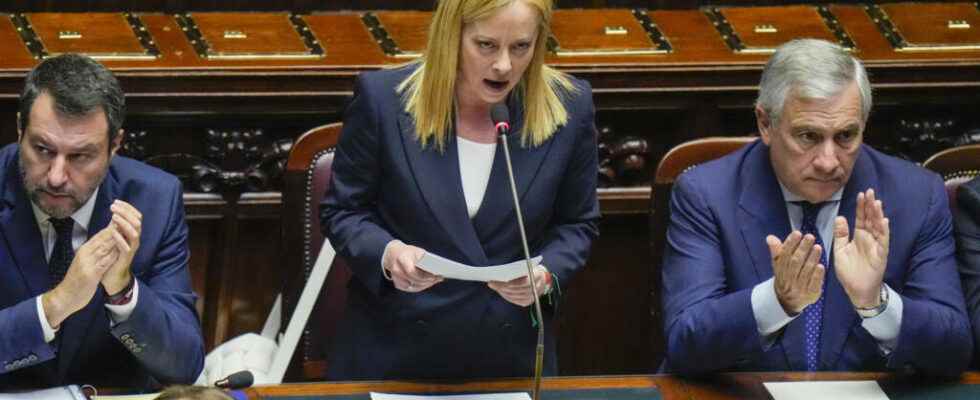Giorgia Meloni is expected this Thursday, November 3 in Brussels, for her first visit as Prime Minister of Italy. The far-right leader will aim to reassure her European partners and secure the funding her country needs. It will be able to rely, in particular, on converging positions vis-à-vis the war in Ukraine.
Unlike other partners in his coalition in Italy, such as Matteo Salvini and Silvio Berlusconi, Giorgia Meloni has always clearly denounced Russian aggression against Ukraine and supported the sanctions imposed on Moscow. This was explained to RFI by Italian MEP Nicola Procaccini, member of Fratelli d’Italia, Giorgia Meloni’s party.
RFI: Why did Giorgia Meloni choose Brussels for her first trip abroad since winning the elections?
Nicola Procaccini: This is not just a courtesy visit. A continuous and constructive exchange with other EU Member States is necessary, especially in such difficult times and internationally. We must act immediately, without wasting time. This is why, from the first hours of her mandate, the new Italian Prime Minister has met in Rome the French President, Emmanuel Macron, this is also why she very quickly had a telephone conversation with the German Chancellor, Olaf Scholz. You know we need to take action to reduce energy prices as soon as possible. We need to come to an agreement on this point.
So the energy crisis is Giorgia Meloni’s main concern? Is this what she wants to talk about first in Brussels?
Yes, absolutely. Our families and businesses are facing a time of great difficulty! And it is necessary to adopt measures immediately to avoid serial bankruptcies, as this would be catastrophic for our economies. It is therefore crucial to have an open dialogue with European countries to introduce these measures and to combat the energy crisis. There are many, many solutions that we can adopt together. For example, capping the price of energy gas. We think this is an important measure.
We must also achieve energy independence. And this is not only true for Italy, but for the whole European Union. Because, if we do not achieve energy independence, we risk becoming dependent on Russia, China or other regimes in the world.
You mentioned Russia. What will Giorgia Meloni’s message be regarding the sanctions?
I believe that during her visit to Brussels, the Prime Minister will also address the issue of the war in Ukraine. In her telephone conversation with Olaf Scholz, she recalled Italy’s commitment to supporting Kyiv on the political, military, economic and humanitarian fronts, and she expressed the crucial importance in our view of the reconstruction of Ukraine.
If new sanctions are to be decided, will the new Italian leader adopt them?
If we need it, yes, of course! We must do everything to support ukraine, because the only way to support our democracies is to support the victims of this terrible aggression. This is not only helping the Ukrainian people, it is also helping our own people. The other way would be to fight directly against Russia and obviously that is impossible. The only alternative is economic sanctions and support for the Ukrainian government. I think it’s hard, it’s a pain for all of us, but it’s the only solution.
Regarding the functioning of Europe, Giorgia Meloni said that Italy will respect European rules. But she also said she wants to change the ones that don’t work. What rules does she want to change?
We believe that Europe should act as a single entity on a few major issues such as defense or energy policy, while leaving the rest of the issues to individual countries to decide. This would guarantee respect for the specificity of each Nation, its history and its traditions, which together constitute the true wealth of Europe. This is change: to ensure that the European Union can do a little better without dispersing its forces and becoming a bureaucratic maze.
As I have said, the energy crisis is one of the major issues on which we believe that Europe must act in a united manner and for which it must assert its role. I would like to recall that the Union between European States after the Second World War was born precisely to collaborate on energy problems. But, unfortunately, over the years and even during the severe energy crisis we are currently facing, Europe has not always managed to act in unity.
What will be Giorgia Meloni’s position in the standoff between the European Union and Hungary and Poland on the primacy of the rule of law and on the conditionality of European aid? Will she stick to Brussels’ position or will she help her Polish and Hungarian friends?
We believe that this aid conditionality is a serious mistake. Europe needs unity and we think it is counterproductive to fight against two important countries like Poland or Hungary. In particular, against Hungary which risks falling into the arms of Russia. Hungary is an independent country, its government was elected in democratic elections and the government of Viktor Orban has the right to carry out its program.
Even if this program is in contradiction with the fundamental values of the Union, such as the primacy of the rule of law?
I have noticed during all these years in the European Parliament that often the rule of law was exploited by those who claim it. This primacy has been used to serve the program and agenda of the European left. So if you try to carry out a conservative agenda, you are automatically accused of flouting the rule of law.
The primacy of the rule of law is a very important thing, a very important value for the European Union, but it must not be a political weapon to fight its enemies. We think that’s one of the things that needs to change because it’s unsatisfactory. In the Treaty, the primacy of the rule of law is serious business. Our opinion is that this should not become an argument in a political debate.
